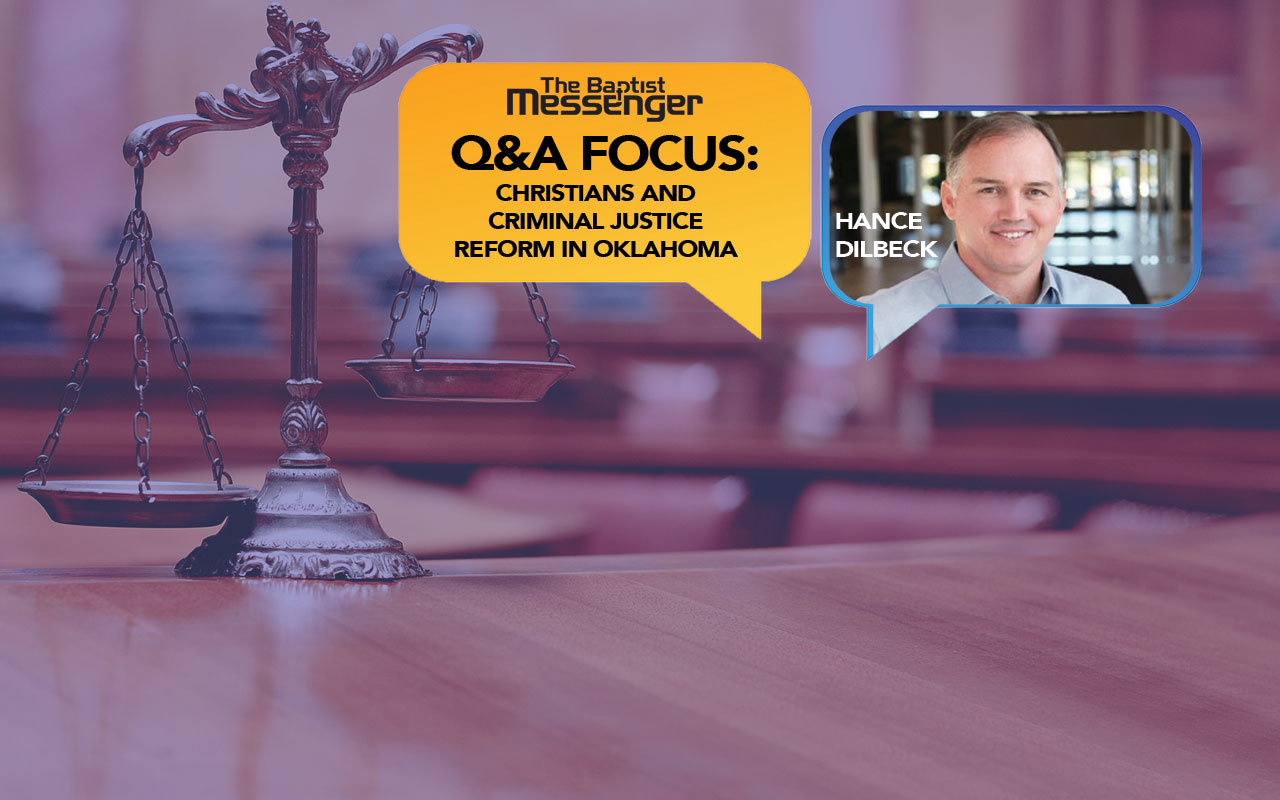A growing conversation is taking place about the exploding prison population in Oklahoma and what it means for the criminal justice system. People from the faith community are adding their voice to the conversation, highlighting the importance of reform, including Pastor Hance Dilbeck, of Oklahoma City, Quail Springs. The Baptist Messenger recently sat down with Dilbeck, who offers his thoughts on the issue.
Baptist Messenger: Oklahoma Baptists are known throughout the state for their stand on moral and ethical issues, including marriage, life and religious liberty. With reports of Oklahoma’s prison population crisis, why did you decide to get involved with criminal justice reform, in addition to the other stands you’ve taken on life, marriage and other issues?
Hance Dilbeck: Yes, recently, I joined other faith leaders from across the state to be part of an effort that takes a smarter approach toward public safety. With the second-highest overall incarceration rate in the country—and the highest incarceration rate for women—Oklahoma’s prison system continues growing, locking away tens of thousands of Oklahomans, many of them coping with the consequences of past mistakes and yearning for a shot at redemption. This trend is deeply concerning to me, as a pastor and Oklahoman, so I decided it was time I added my voice to this need.
Messenger: Can you describe this effort more?
Dilbeck: The coalition, called Oklahomans for Criminal Justice Reform, is supported by some of Oklahoma’s strongest faith and business leaders, law enforcement and policy experts, and it is taking the form of a ballot initiative in Oklahoma.
Messenger: Can you tell us about what this ballot initiative does?
Dilbeck: This group is in the signature collection stage of the ballot initiative, and it would put two State Questions for a vote this November. The purpose of the ballot initiative will relieve the financial pressures our prison system places on the backs of taxpayers—at nearly $500 million a year. It also seeks to make our communities safer, and strengthen our families by giving low-level offenders an opportunity to become healthy, reunite with their children and spouses, and return to their communities to live with meaning and purpose.
The ballot initiative reclassifies certain low-level offenses—like drug possession and property offenses—as misdemeanors instead of felonies, which triggers savings from decreased incarceration costs. The initiative then returns those savings to local communities to support rehabilitation programs that treat mental health conditions and drug addiction, which are often the causes of criminal behavior. It also invests in education and job training to help low-level offenders turn their lives around, find employment, and avoid going back to prison. These reforms address the root causes of crime, driving down our prison population and increasing public safety.
Messenger: How does Christ call us to care about criminal justice, and what are some theological implications of this?
Dilbeck: You might be thinking, “With all the people who need help in our state, why care about criminals?” Consider two words: Creation and Redemption. We believe people are created in the image of God. People have worth, not because they are innocent, but because they are human. The biblical promises of Redemption are offered to all people. We believe that Jesus changes people. Ruined sinners can be reclaimed. The Gospel of Jesus Christ is the power of God unto salvation for everyone who believes. Christians can shine the light of our core convictions by embracing this issue of Criminal Justice Reform.
Messenger: Why is now the right time to reform the criminal justice system?
Dilbeck: Many of these individuals are in need of rehabilitation and treatment for drug addiction and mental health conditions. Instead, they are sitting in cellblocks, untreated and often forgotten.
It is time to reform Oklahoma’s criminal justice system. We must transform our system from one rooted in prisons and punishment to one that believes in a higher purpose. Fortunately for Oklahomans, a new effort is doing just that.
So many low-level offenders are imprisoned in a system inadequate to treat addiction or mental health issues, and after incarceration many are left struggling to access housing, employment, and education. In the end, it destroys families and communities, and does very little to help them avoid re-incarceration.
Messenger: What happens if we do nothing?
Dilbeck: A more troubling cost that can’t be reflected in any price tag: children, families, people. We need a justice system that enhances public safety and reduces crime—like the initiative does—but just as important, Oklahomans deserve a justice system that fosters strong families and improves quality of life. Children shouldn’t be torn from their mothers and fathers, and families shouldn’t slowly deteriorate because our justice system is without a redemptive focus.
I personally believe our faith in Christ, Creator and Redeemer, should move us to turn out in November in support of this ballot initiative.





